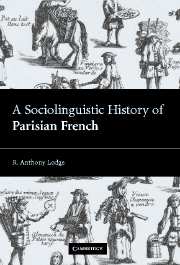Book contents
- Frontmatter
- Contents
- List of maps
- List of tables
- List of figures
- Acknowledgments
- List of phonetic symbols
- Part 1 Preliminaries
- Part 2 The pre-industrial city
- 3 The demographic take-off
- 4 The beginnings of Parisian French
- 5 The medieval written evidence
- Part 3 The proto-industrial city
- Part 4 The industrial city
- Conclusion
- Appendix Literary imitations of low-class speech
- Bibliography
- Index
4 - The beginnings of Parisian French
Published online by Cambridge University Press: 22 September 2009
- Frontmatter
- Contents
- List of maps
- List of tables
- List of figures
- Acknowledgments
- List of phonetic symbols
- Part 1 Preliminaries
- Part 2 The pre-industrial city
- 3 The demographic take-off
- 4 The beginnings of Parisian French
- 5 The medieval written evidence
- Part 3 The proto-industrial city
- Part 4 The industrial city
- Conclusion
- Appendix Literary imitations of low-class speech
- Bibliography
- Index
Summary
The earliest phases of new languages are always the least well documented and Parisian French in the medieval period is no exception. Given the dearth of contemporary evidence, our attempts at historical reconstruction are fated to remain speculation. However, not all avenues of approach are blocked off. In this chapter, let us examine the set of language varieties present in Paris and the Paris region in modern times – standard French, colloquial Parisian speech and the hinterland dialects – with a view to discovering, by back-projection, how this particular configuration might have arisen historically. In Chapter 5 we will confront our findings with such evidence as is to be found in texts written in medieval Paris.
Urban dialects are commonly seen as modified versions of the standard language, and the uneducated speech of Paris is traditionally thought of as just such a corruption of standard French. Recent work by Milroy (1981) and Harris (1985), on the other hand, has revealed that, as a rule, urban dialects are not failed attempts to approximate to some high-prestige standard, but are modified forms of the dialects spoken in the surrounding countryside. Moreover, human concentrations undergoing rapid growth in the modern world have been shown to provide a prime locus for dialect-mixing and koinéisation. Perhaps something like this occurred in medieval Paris. Back-projection cannot explain the past with certainty, but it limits the range of plausible hypotheses we might wish to set up.
- Type
- Chapter
- Information
- A Sociolinguistic History of Parisian French , pp. 53 - 79Publisher: Cambridge University PressPrint publication year: 2004



